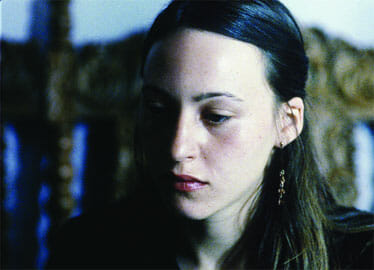Our Music

This provocative new film from Jean-Luc Godard is one of the most beautiful films this year. Our Music is a dense blend of fact and fiction, essay and poem, and image and wordplay. Watching it is a tremendously rewarding, albeit humbling, experience.
The movie has three parts: Hell, Purgatory and Heaven. Godard spends a full hour of this 80-minute movie in purgatory, but only after dipping our feet into the flames of hell, which in this film is war, depicted by a montage of ugly video and harsh piano. The tender voice of a female narrator prays, “Let us be forgiven of our trespasses as we have forgiven those who trespass against us.” But then she adds, mournfully, sardonically, “Yes, in the same way,” which is to say: “not much.”
It’s a powerful, sorrowful opening that ends with a title that introduces the second segment, Purgatory, where the movie takes a sharp turn. Shot cleanly on film, it starts with a perfect image: two streetcars, one black, one white, one going one way, one going the other. The Purgatory segment has a narrative of sorts. It’s about a literary conference in Sarajevo at which Godard himself will give a lecture on “text and the image,” and Hell’s narrator appears as Olga, a young Jewish journalist who has come to Sarajevo “to see what reconciliation looks like.” She lives in Tel Aviv and is wrestling with the conflict between Israel and Palestine. She soon becomes the soul of the movie, the only character who appears in all three segments. As she tours the city with other people attending the conference, their conversations begin to sound symmetrical, like the structure of the movie itself. They talk about Serbia and Croatia; Palestine and Israel; individuals and the State; you and me.
But Godard quickly begins to subvert this clean, mirrored construction with an array of fascinating ideas that attempt to understand symbiotic but unequal relationships. “Why aren’t revolutions started by the most humane people?” someone asks. “Because humane people don’t start revolutions,” Godard answers, “they start libraries.” Someone else adds, “And cemeteries.”